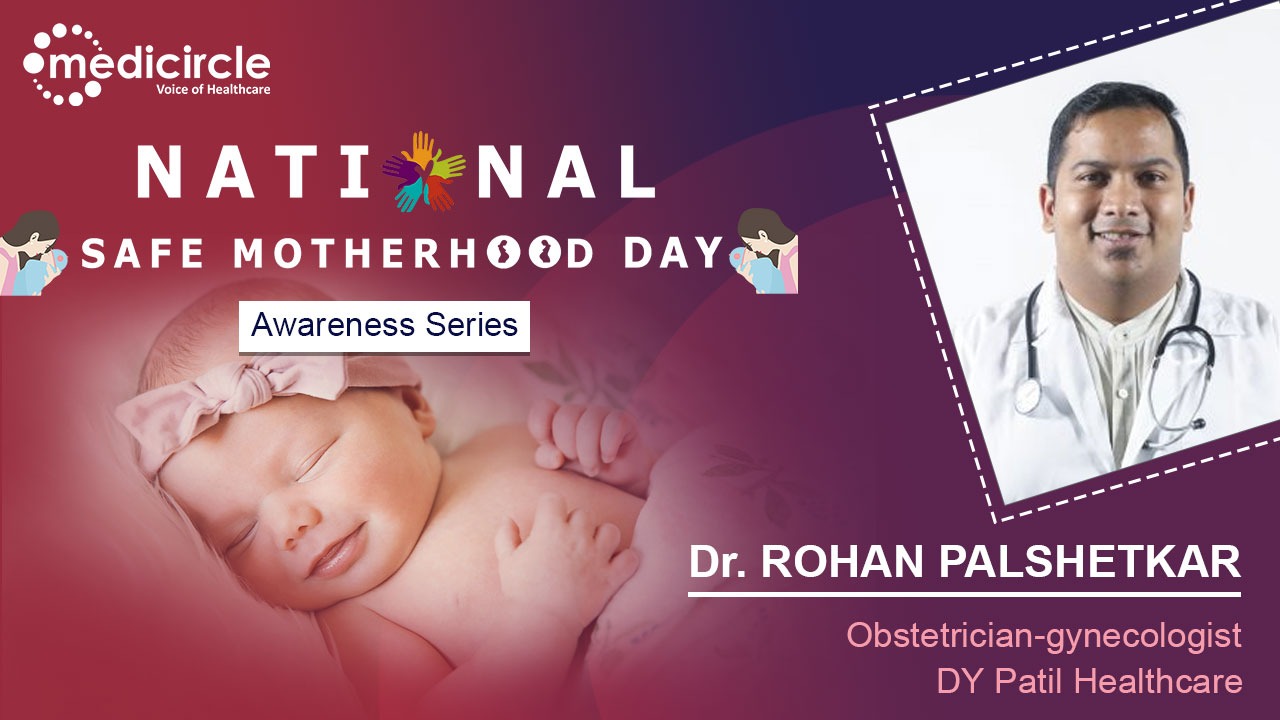Being a mother is one of the most phenomenal events in a woman's life. Nothing gives some more joy than holding a baby in her arms. But for some women, it is a challenge being a mother during all this for the ongoing outbreak of the coronavirus pandemic. Feeling anxious and feeling uncertainty has crept in during the otherwise happy time, yet they have handled the situation quite gracefully. At Medicircle, we present to you the National Safe Motherhood Awareness Series, wherein we are featuring some successful Mompreneurs, Obstetricians and Gynecologists, other healthcare professionals, and entrepreneurs who are working on safe motherhood to raise awareness about adequate access to care during pregnancy and childbirth and postnatal services.
Dr. Rohan Palshetkar is a practicing Obstetrician, Gynecologist, Infertility Specialist, and endoscopic surgeon in Mumbai. He is also a managing committee member of Mumbai OBG society, Maharashtra officer, joint secretary, and joint treasurer of the committee. He has won many awards including the Asia Oceania Young Gynecologist Award.
Maternal Mortality Rate status and improvement in India
Dr. Rohan Palshetkar says, “To tackle this problem, Our government is doing a wonderful job of giving family planning advice to every mother. Some of the best planning advice are as follow:
Postpartum IUCD: This contraception device allows the mother to give a space between two pregnancies which can reduce chances of anemia.
Antenatal care: It is very important to encourage mothers to come for more frequent visits. Initially, two or three visits were enough. But, now the entire concept is changed. We advise women to come for frequent antenatal visits to evaluate the low and high-risk groups.
Being Infertility Specialist, we come across a lot of high-risk pregnancy cases. So, increasing the antenatal visits will be better for pregnant mothers. There are many NGOs that are coming to the forefront and making sure to give prenatal vitamins. The government is providing prenatal iron, folic acid, calcium-free of cost as per the policy. This is a small thing to improve the Maternal Mortality Rate (MMR).”
Maternal Mortality Rate (MMR) in India
Dr.Palshetkar emphasizes, “India is on a decreasing trend. So, the Maternal Mortality Rate (MMR) is improving and our efforts are showing results. We have LaQshya many programs where many centers make sure of the good quality of care for mothers. The LaQshya manyata lecture program in Maharashtra is the first public-private organization. This is improving results. It is important to counsel mothers for postpartum care where we speak to married women and young girls as well. It is important to control STD infections, HIV or AIDS. In fact, in 2019, my mother, Dr.Nandita Palshetkar who is president of FOGSI has created many programs to reduce the transmission of diseases. The government is providing a lot of medical free care to pregnant mothers to prevent HIV transmission. So, these are the small steps towards safe motherhood. "
Causes of Maternal Mortality Rate
Dr.Palshetkar informs, “We do a large number of deliveries because of which the Maternal Mortality Rate is high. We can see the decreasing trend which means efforts are being made towards it. Some important causes which increase the Maternal Mortality Rate are :
Hypertension in pregnancy Postpartum bleeding Inadequate infrastructure Adequate nutrition Anemia Malnourishment
All this can lead to a lot of problems during delivery, not only for the mother but also for the baby. Early detection is very important to increase hypertension, which is the most common medical disorder in pregnancy and growing rampant in India.
Importance of medical facilities in rural areas
Dr.Palshetkar states, “Importance should be given to big tertiary care hospitals rather than a small center in a village to make sure that ICU facilities and blood banks are made available in case of emergencies. Infrastructure is developing in Maharashtra. The mortality rate is also decreasing in the interior. So, Kudos to our government for improving the infrastructure facilities. Of course, there is room for improvement of blood banks, ICU facilities, delivery rooms, and ambulances. These small things can improve the situation of parents and ability to get good quality care and within good time.”
Awareness among pregnant women is a must
Dr. Palshetkar says, “ Pregnant woman must be aware of the following:
Folic acid supplementation: This is very important to prevent birth defects. Women should be made aware of the same.
Excessive vomiting: During the first three months, vomiting is a part of pregnancy. Excessive vomiting where the patient is throwing up 10 - 15 times needs special care. It is important to approach doctors in such cases.
Bleeding: approach your doctor in case of bleeding during pregnancy.
Anemia: Anaemia is the most common problem in India which is creating major problems for baby growth. Anemia can lead to reduced breastfeeding post-delivery which can affect the growth of the baby.
Hypertension
Antenatal visits
Warning signals during pregnancy
Dr.Palshetkar informs, “The main warning signals during pregnancy are :
Bleeding in any trimester Excessive weight Hypertension Anemia Nourishment Abdominal cramping Excessive white discharge
So, these are the few points which a woman should be aware of during pregnancy.” says Dr.Palshetkar
(Edited by Dr.Rati Parwani)

 Dr.Rohan Palshetkar gives importance to antenatal care for the better health of pregnant women and babies. He emphasizes the awareness of pregnant women which is necessary and a must for every woman.
Dr.Rohan Palshetkar gives importance to antenatal care for the better health of pregnant women and babies. He emphasizes the awareness of pregnant women which is necessary and a must for every woman.




















.jpeg)










.jpg)
.jpeg)